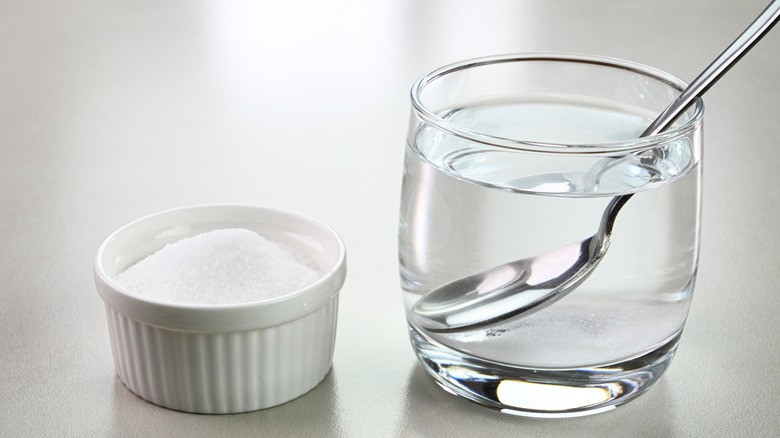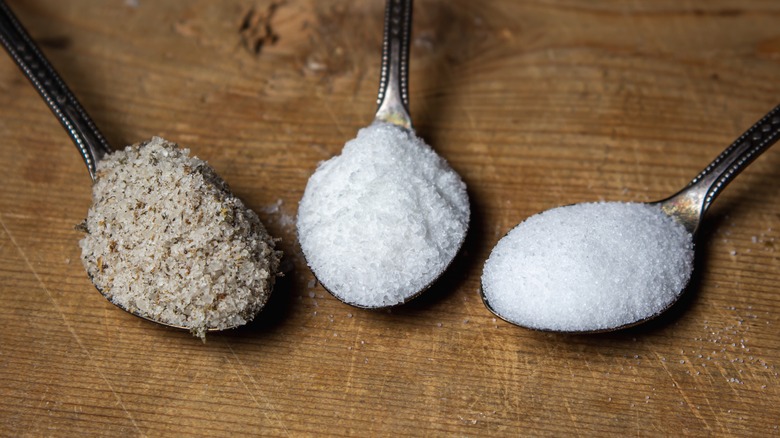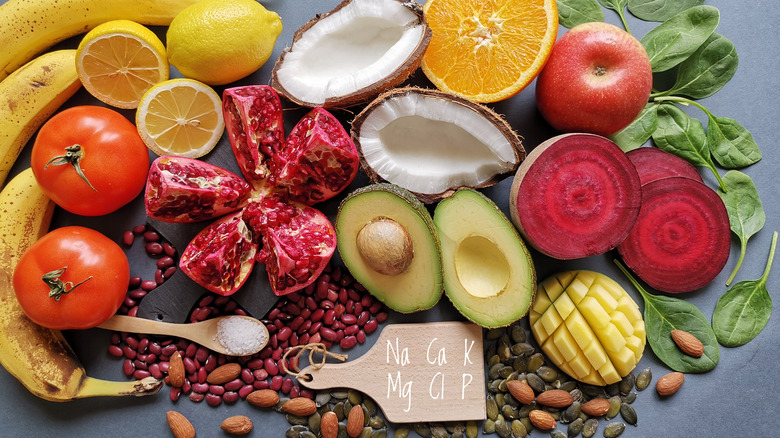If You're Drinking Salt Water, Use Sea Salt
Although getting health advice from social media can be dangerous, many people are following a TikTok trend that advocates for drinking salt water. While some of the reported health benefits are far-fetched, salt is comprised of sodium and chloride (NaCl), two of the electrolytes the body needs for hydration. When mixed with water, they support vital functions, like keeping your heart beating. The amount of electrolytes you require depends on age, gender, activity level, climate, and diet. In addition, whether you are nursing, have a chronic disease, or are taking certain medications can affect this delicate balance.
Generally, a healthy diet and mindful eating can keep your electrolytes in balance. However, people who are excessively sweating from prolonged physical activity, especially in hot weather, or spend a lengthy time in a sauna could benefit from an electrolyte supplement. Rather than relying on sports drinks loaded with sugar, salt water can boost hydration.
Before you reach for the salt shaker, it's essential to use the right type to get the most out of this DIY remedy. There are many types of cooking salt. The variety used for baking may not be the right one to finish a dish. Similarly, when drinking salt water, it's best to use sea salt and avoid highly processed table salt. Mix 1/16 of a teaspoon of sea salt with eight to 12 ounces of water to help your body replenish fluids.
Why you should use sea salt
While all types of salt contain the same amount of sodium, other characteristics differentiate them. Your supermarket's salt aisle likely contains many varieties, such as table, kosher, sea, red, and other flavored options. Price points are all over the place, ranging from $0.05 an ounce for powdery table salt to $35 per ounce for flaky fleur de sel.
Iodized table salt is the least expensive of the lot and was the home cook's only option for years. While it's still widely used for baking, it's not recommended for your salt water. In the 1920s, when thyroid diseases were prevalent, the compound's natural minerals were stripped and replaced with iodine. The additive gives the salt a metallic taste, and its fine consistency makes it much saltier by volume than other varieties. Even Ina Garten refuses to use table salt in her recipes.
Although most chefs prefer kosher salt for cooking purposes, sea salt is a better choice for drinking salt water. It's less refined and can contain trace amounts of 60 different minerals, including iron, magnesium, potassium, and calcium. Sea salt is harvested globally from evaporated seawater, so the color and taste of different brands will vary. Maldon Sea Salt is a good choice, harvested from the United Kingdom. As is France's sel gris, which is collected from sea foam. Sea salt can be purchased coarsely ground, but select finely ground, which dissolves quicker in water.
Does anyone actually need to do this?
While there are scenarios warranting drinking salt water, there are risks associated with increasing your sodium intake. People temporarily experiencing vomiting, diarrhea, or high fever and athletes experiencing muscle cramps, extreme thirst, or fatigue from exercising may be showing signs of dehydration and benefit from drinking salt water. However, they should limit it to once daily. In many cases, plain water is all you need, and if you're looking for a more flavorful beverage, milk and orange juice are good for hydration.
You should consult with your doctor before routinely drinking salt water. Americans already consume too much sodium, with 90% of children eating more than the CDC recommends. Diets high in processed food and frequent meals eaten out are primary contributors. Salty snacks like potato chips are obvious culprits, but store-bought bread, crackers, and deli meat are also high in sodium. Eating these packaged foods daily can contribute to high blood pressure and increase the risk of heart disease and stroke.
Most people can naturally absorb electrolytes from the foods they eat. Vegetables like spinach, broccoli, kale, and avocados contain electrolytes, as do plenty of fruits like oranges, strawberries, bananas, and watermelon. Before a strenuous workout, try snacking on yogurt or olives or make a supercharged mix containing almonds, raisins, and peanuts. Post-workout, enjoy meals that incorporate electrolyte-rich lean proteins like tofu, turkey, chicken, and certain fish, like flounder.



